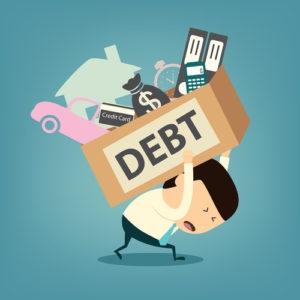It's a startling fact, but according to research by the TUC, Britain's household debt is now at an all time peak with families now owing an average over over £15000. The main debts being credit cards and banks. The main reasons behind the debt being austerity and unemployment.

It is far too easy to get yourself into debt but can be incredibly difficult to get out of debt .Debt occurs due to borrowing beyond your means or a change of circumstances which means you are no longer able to afford the original payments. Debt is responsible for homelessness depression, anxiety and has even unfortunately led to people taking their own lives. Bad debt can even affect employment and other things due to it be recorded on your credit report.
Thousands of families in the UK, live in fear of the bailiffs calling. These people have piles of final demand letters from debt companies and at worst county courts demanding payments they cannot afford. They dread the sound of a hefty door knock, they dread answering the phone to an unknown number and live a life of being uncertain of what will happen from one day to the next.
This is possibly the worst case scenario when it comes to debt. Therefore if you don't want to be fearing that knock but have letters starting to pile up! Then it's important to get your debts in order before it gets to that stage. There are many things you can do and help you can get. It's important not to ignore debt, I've tried doing this many years back and believe me it will not just go away. So here are just a few things you can do to help get those debts in order and then get on with your life.
1) Write down your debts: sounds simple but many people don't actually know how many debts they have or the total of what's owed. Writing down all your debts on one page and amounts owed can really help to see where you're at.
2) Prioritise debts - There's a lot of information on the internet which helps with this. It's important as certain unpaid debts will end up with bailiffs where as others won't. Council tax, rent, mortgage, gas, electricity, court fines plus a few others are priority which should always be paid first and on time where possible. Bank loans, credit cards, catalogues etc are classed as non priority debts. This doesn't mean you don't have to pay them but it's slightly less serious if you can't.
3) Try to pay off the highest debts first - if you find yourself just about managing to pay some debts off then go for the highest debt first, the one with the higher interest rate. Then once paid focus on the next etc. Obviously keep paying all the debts but pay more than the minimum payment for the higher one.
4) Speak to your debtors - They are human too and often understanding if you explain your circumstances. Quite often in the case of credit cards and catalogues, a reduced monthly payment plan will be arranged and they will freeze the interest.
5) Get advice - This is vital if your bills are piling up or you've had county court judgements. Beware of scam debt advice online who charge. The citizens advice are great for these types of situations.
6) Pay off all your debts with one loan - This may sound a crazy idea to take out more debt when you're already in debt but it does work for many people. One large loan will usually work out much cheaper monthly payments than several debts each month. A search of the web will bring up many online loans with all different terms and conditions. Paying back one loan per month instantly clears off all other debts and also improves your credit report.

